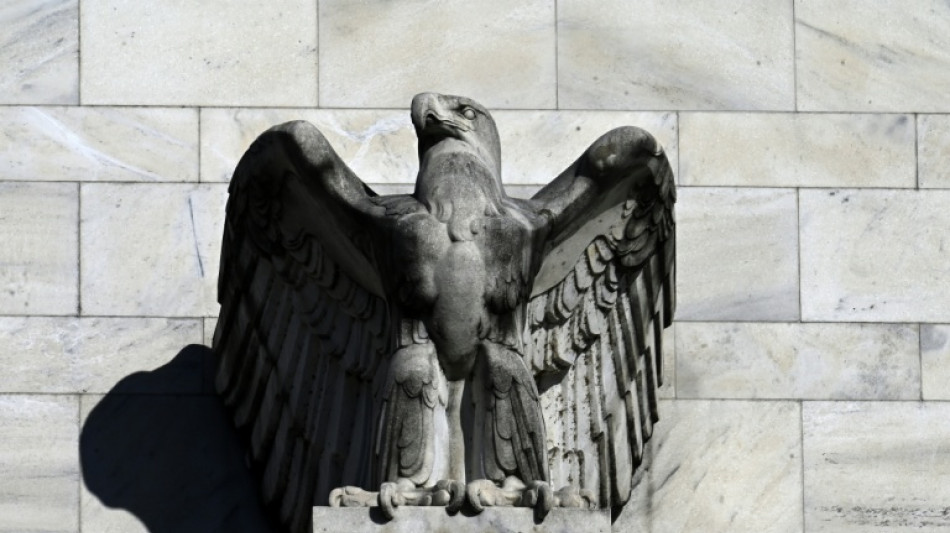
-
 2026 T20 World Cup 'biggest women's cricket event in England' - ECB
2026 T20 World Cup 'biggest women's cricket event in England' - ECB
-
Bangladesh begins three days of mass political rallies

-
 Children learn emergency drills as Kashmir tensions rise
Children learn emergency drills as Kashmir tensions rise
-
Millions of children to suffer from Trump aid cuts

-
 Veteran Wallaby Beale set for long-awaited injury return
Veteran Wallaby Beale set for long-awaited injury return
-
Syria's Druze take up arms to defend their town against Islamists

-
 Tesla sales plunge further in France, down 59% in April
Tesla sales plunge further in France, down 59% in April
-
US calls on India and Pakistan to 'de-escalate'

-
 Israel reopens key roads as firefighters battle blaze
Israel reopens key roads as firefighters battle blaze
-
Europe far-right surge masks divisions

-
 James will mull NBA future after Lakers playoff exit
James will mull NBA future after Lakers playoff exit
-
Ukraine's chief rabbi sings plea to Trump to side with Kyiv

-
 Australian mushroom meal victim 'hunched' in pain, court hears
Australian mushroom meal victim 'hunched' in pain, court hears
-
Lakers dumped out of playoffs by Wolves, Rockets rout Warriors

-
 Booming tourism and climate change threaten Albania's coast
Booming tourism and climate change threaten Albania's coast
-
US reaching out to China for tariff talks: Beijing state media

-
 Tariffs prompt Bank of Japan to lower growth forecasts
Tariffs prompt Bank of Japan to lower growth forecasts
-
Kiss faces little time to set Wallabies on path to home World Cup glory

-
 Serbian students, unions join forces for anti-corruption protest
Serbian students, unions join forces for anti-corruption protest
-
Slow and easily beaten -- Messi's Miami project risks global embarrassment

-
 Fan in hospital after falling to field at Pirates game
Fan in hospital after falling to field at Pirates game
-
Nuclear power sparks Australian election battle

-
 Tokyo stocks rise as BoJ holds rates steady
Tokyo stocks rise as BoJ holds rates steady
-
Bank of Japan holds rates, lowers growth forecasts

-
 'Sleeping giants' Bordeaux-Begles awaken before Champions Cup semis
'Sleeping giants' Bordeaux-Begles awaken before Champions Cup semis
-
Napoli eye Scudetto as Inter hope for post-Barca bounce-back

-
 Germany's 'absolutely insane' second tier rivalling Europe's best
Germany's 'absolutely insane' second tier rivalling Europe's best
-
PSG minds on Arsenal return as French clubs scrap for Champions League places

-
 UK WWII veteran remembers joy of war's end, 80 years on
UK WWII veteran remembers joy of war's end, 80 years on
-
Myanmar junta lets post-quake truce expire

-
 Rockets romp past Warriors to extend NBA playoff series
Rockets romp past Warriors to extend NBA playoff series
-
Messi, Inter Miami CONCACAF Cup dream over as Vancouver advance

-
 UN body warns over Trump's deep-sea mining order
UN body warns over Trump's deep-sea mining order
-
UK local elections test big two parties

-
 US judge says Apple defied order in App Store case
US judge says Apple defied order in App Store case
-
Seventeen years later, Brood XIV cicadas emerge in US

-
 Scorching 1,500m return for Olympic great Ledecky in Florida
Scorching 1,500m return for Olympic great Ledecky in Florida
-
Israel's Netanyahu warns wildfires could reach Jerusalem

-
 Istanbul lockdown aims to prevent May Day marches
Istanbul lockdown aims to prevent May Day marches
-
DEA Unconstitutional Marijuana Hearing - MMJ to File Emergency Injunction and Suit for Irreparable Harm

-
 Formation Metals Announces Appointment of Adrian Smith to Advisory Committee
Formation Metals Announces Appointment of Adrian Smith to Advisory Committee
-
Cerrado Gold Announces Q4 And Annual 2024 Financial Results

-
 Australian guard Daniels of Hawks named NBA's most improved
Australian guard Daniels of Hawks named NBA's most improved
-
Mexico City to host F1 races until 2028

-
 Morales vows no surrender in bid to reclaim Bolivian presidency
Morales vows no surrender in bid to reclaim Bolivian presidency
-
Ukraine, US sign minerals deal, tying Trump to Kyiv

-
 Phenomenons like Yamal born every 50 years: Inter's Inzaghi
Phenomenons like Yamal born every 50 years: Inter's Inzaghi
-
Ukraine, US say minerals deal ready as Kyiv hails sharing

-
 Global stocks mostly rise following mixed economic data
Global stocks mostly rise following mixed economic data
-
O'Sullivan says he must play better to win eighth snooker world title after seeing off Si Jiahui


With Fed set to hike US rates, 'ultra-cheap money' era nears end
Consumers, companies and financial markets are bound to see borrowing costs rise as the Federal Reserve gets ready to hike rates after two years of loose policy meant to support the US economy during the pandemic.
At the conclusion of its policy meeting on Wednesday, Fed Chair Jerome Powell opened the door to raising rates in March, and most analysts expect a total of three hikes this year alone.
But the world's largest economy is showing signs of tighter lending conditions even before the Fed has acted.
Rates on 30-year fixed mortgages have jumped, from 2.77 percent in August to 3.56 percent on average, according to refinancing giant Freddie Mac.
"Borrowers feel that pain, much more so than looking at a broader context where three-and-a-half percent was a record low prior to the pandemic," said Greg McBride, chief financial analyst at Bankrate.com.
Corporations have also taken note, with JPMorgan Chase CFO Jeremy Barnum saying in a recent earning call, "Obviously, with higher rates, we expect things to be weaker next year" for mortgage volume.
On Wall Street, "a recalibration" is at work for "some of the most speculative parts of the market," according to Zachary Hill, strategist at Horizon Investments.
Since March 2020, individuals and institutional investors alike have aggressively bought and traded risky assets to take advantage of almost unlimited access to capital.
The Fed's moves to both raise rates and end its stimulus program of purchasing bonds and securities could take some of the steam out of markets.
- 'Meme stock' slowdown -
Stocks have reacted negatively to this paradigm shift, with pandemic darlings such as trading platform Robinhood down 85 percent from early August, and at-home fitness company Peloton 84 percent lower over the 12 months to January.
"Meme stocks" that saw surges fueled by social media interest are also experiencing a hangover, with video game store GameStop down 59 percent and movie theater chain AMC 78 percent below its high in June.
Cryptocurrencies, another poster child for speculative assets, have seen a severe correction over the last two months. Bitcoin is down nearly 30 percent, and ethereum has lost more than 40 percent.
"Crypto assets are highly sensitive to the fortunes of the stock market and have been propelled higher in this era of ultra-cheap money, so it's no surprise they have been hit with a severe case of the jitters as policy makers ponder their next move," wrote Susannah Streeter, an analyst at Hargreaves Lansdown.
At the opposite end of the risk spectrum, the US government has also been drawn to the mix, offering 1.72 percent on a recent 10-year Treasury note auction, versus 1.33 percent in September.
Credit conditions are already tightening for corporations, through bonds and loans.
"Markets have been quite addicted to zero interest rates and basically zero borrowing costs," said Kim Rupert, the managing director of global fixed income analysis for Action Economics.
However, she predicted demand will remain strong for the debt of companies with strong finances, which "will limit any real increase" in corporate bonds' yields.
- 'Dicey proposition' -
The transition could be tougher for less financially sound companies. So-called "junk bonds," issued by these corporations, "might be the worst asset class for now bond-wise," Rupert said.
With the dollar edging higher against major currencies, which can also be connected to the Fed's shift and could potentially be a drag for US exports, these bonds have become even less attractive, the analyst added.
After a record 2021, IPOs as well as mergers and acquisitions could be "a little bit more of a dicey proposition" until mid-2022, when the Fed will have provided a clearer picture of its time frame to normalization.
Although credit and funding conditions are expected to remain highly favorable in historic standards, economists warn that a miscalibrated tightening could trigger a US economic slowdown.
"I think the modus operandi of the Fed is to be as flexible as possible, given all of the uncertainty and challenges that face them in the coming months," said Bob Schwartz, senior economist at Oxford Economics.
A.Rodriguezv--AMWN